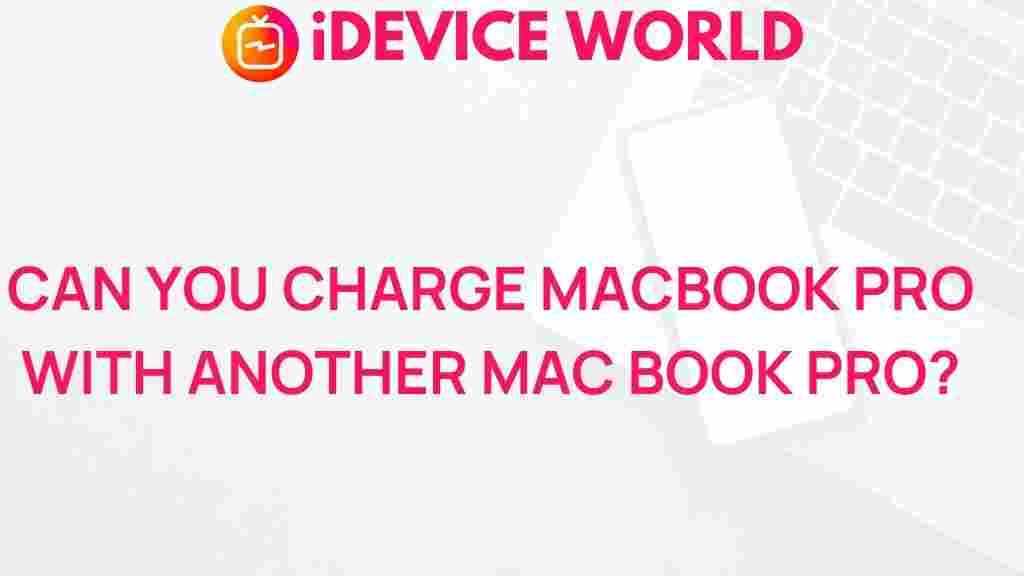Unveiling the Shocking Truth: Can You Charge a MacBook Pro with Another MacBook Pro?
The MacBook Pro is known for its powerful performance, sleek design, and advanced features. As technology continues to evolve, so do the ways we can utilize our devices. One intriguing question that arises among MacBook Pro users is whether it’s possible to charge one MacBook Pro using another. In this article, we will explore this question in depth, uncovering the facts, processes, and implications of charging a MacBook Pro with another MacBook Pro.
Understanding the MacBook Pro Charging Mechanism
Before delving into the charging capabilities between two MacBook Pros, it’s essential to understand how the charging system works in these devices.
- USB-C Ports: The latest MacBook Pro models come equipped with USB-C ports that support both charging and data transfer. These ports can be used to connect various devices and accessories.
- Power Delivery: USB-C incorporates a technology called Power Delivery (PD), which allows devices to negotiate the amount of power being delivered over the cable.
- Batteries: Each MacBook Pro has its own battery management system that regulates how power is drawn and charged.
The Concept of Reverse Charging
Reverse charging refers to the ability of one device to supply power to another. In theory, it is possible to use a MacBook Pro to charge another MacBook Pro due to the USB-C ports and Power Delivery technology. However, practical implementation raises some questions.
Step-by-Step Process: How to Charge a MacBook Pro with Another MacBook Pro
If you’re curious about how to charge your MacBook Pro using another, follow these steps:
Step 1: Gather Your Equipment
You will need:
- Two MacBook Pro devices
- A USB-C charging cable
Step 2: Connect the MacBook Pros
Use the USB-C charging cable to connect the two MacBook Pro devices. Plug one end into the USB-C port of the MacBook Pro that will be supplying power, and the other end into the port of the MacBook Pro that needs charging.
Step 3: Monitor the Charging Status
Once connected, the charging process should initiate automatically. You can check the battery status on the receiving MacBook Pro by clicking on the battery icon in the menu bar. If the charging icon appears, the device is receiving power.
Step 4: Disconnect After Charging
Once the battery of the receiving MacBook Pro has reached an adequate charge level, disconnect the USB-C cable to prevent any potential battery management issues.
Key Considerations When Charging a MacBook Pro with Another MacBook Pro
While charging one MacBook Pro with another is possible, there are several considerations to keep in mind:
- Power Output: The charging power output from one MacBook Pro may not be sufficient to rapidly charge another. This is particularly relevant if the supplying MacBook Pro has a lower battery percentage.
- Charging Speed: Charging speeds may be significantly slower than when using a dedicated charger. This can be an inconvenience if you require quick power.
- Battery Health: Continuously using one MacBook Pro to charge another can impact the battery health of both devices over time.
Troubleshooting Tips
If you encounter issues while attempting to charge your MacBook Pro with another, consider the following troubleshooting tips:
Check the Cable
Ensure that the USB-C cable you are using supports Power Delivery. Not all USB-C cables are created equal, and using a standard cable may not facilitate charging.
Verify Ports and Connections
Inspect both MacBook Pro devices for any debris or damage in the USB-C ports. Ensure the connections are secure and clean.
Battery Status
If the charging does not initiate, check the battery status of the supplying MacBook Pro. If its battery is low, it may not be able to provide power to another device.
Restart the Devices
Sometimes, a simple restart can resolve connectivity issues. Restart both MacBook Pros and attempt the charging process again.
Conclusion
In conclusion, it is indeed possible to charge a MacBook Pro using another MacBook Pro, thanks to the innovative USB-C and Power Delivery technologies. However, users should be aware of the limitations, including slower charging speeds and potential impacts on battery health. For those who find themselves in a pinch without a charger, this method can serve as a temporary solution.
For more tips on optimizing your MacBook Pro’s performance and battery life, check out our comprehensive guide here.
As technology advances, it’s essential to stay informed about the capabilities of your devices. Understanding how to leverage features like reverse charging can enhance your overall experience with your MacBook Pro.
For additional resources and further reading on charging devices, visit this external link.
This article is in the category Reviews and created by iDeciveWorld Team
